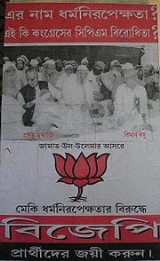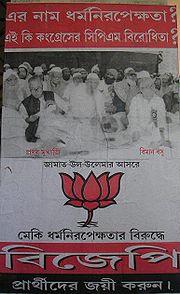
Pseudo-secularism
Encyclopedia
Pseudo-secularism is the state of implicit non-secular trends in the face of pledged secularism
. The term is used by groups who perceive a double standard
exhibited within the established secular governing policy towards culturally different groups.
The first recorded use of the term was in the book Philosophy and Action of the R. S. S. for the Hind Swaraj
, by Anthony Elenjimittam. In his book, Elenjimittam accused leaders of the Indian National Congress, of pretending to uphold secularism. He singles out then Prime Minister Jawaharlal Nehru's refusal to serve on the Congress Working Committee in 1951, which led to the resignation of the Congress Purushottam Das Tandon.
 Since an amendment in 1976, the constitution of India describes the country as 'secular', and generally most mainstream political forces describe themselves as 'secular'. It is important to note that in the Indian context the term is mainly used as an opposite of 'communal', rather than describing the role of state-religion relations.
Since an amendment in 1976, the constitution of India describes the country as 'secular', and generally most mainstream political forces describe themselves as 'secular'. It is important to note that in the Indian context the term is mainly used as an opposite of 'communal', rather than describing the role of state-religion relations.
One of the most comprehensive studies of Indian secularism has been done by Donald Eugene Smith in his book India: As a Secular State. It succinctly sums the differences between Gandhi and Nehru on the issue of secularism, and describes how this divergence sometimes created problems for the government in the early years of Independence.
The Hindu nationalist movement claim that the Indian National Congress
and the associated Communist Party of India
are pseudo-secularist. Their claim is that leftists in India are not truly secular since they appease minority communities (such as Muslims or Christians in India) at the expense of the interests of the Hindu community, and often at odds with modern ideas of secularism .
A major issue raised by the Hindu nationalist movement is the implementation of a uniform civil code of India and its opposition to separate legal codes for religious communities, such as the Shariat bill, and the Indian government's subsidy of the travel of Indian Muslims to Saudi Arabia
to visit Mecca
(Hajj subsidy).
In India, courts have ruled that Sharia
, Muslim law, holds precedence for Muslims over Indian civil law, which caused considerable anguish among Hindus and fueled allegations of pseudo-secularism against the judiciary as well.
Secularism
Secularism is the principle of separation between government institutions and the persons mandated to represent the State from religious institutions and religious dignitaries...
. The term is used by groups who perceive a double standard
Double standard
A double standard is the unjust application of different sets of principles for similar situations. The concept implies that a single set of principles encompassing all situations is the desirable ideal. The term has been used in print since at least 1895...
exhibited within the established secular governing policy towards culturally different groups.
The first recorded use of the term was in the book Philosophy and Action of the R. S. S. for the Hind Swaraj
, by Anthony Elenjimittam. In his book, Elenjimittam accused leaders of the Indian National Congress, of pretending to uphold secularism. He singles out then Prime Minister Jawaharlal Nehru's refusal to serve on the Congress Working Committee in 1951, which led to the resignation of the Congress Purushottam Das Tandon.
In India

One of the most comprehensive studies of Indian secularism has been done by Donald Eugene Smith in his book India: As a Secular State. It succinctly sums the differences between Gandhi and Nehru on the issue of secularism, and describes how this divergence sometimes created problems for the government in the early years of Independence.
The Hindu nationalist movement claim that the Indian National Congress
Indian National Congress
The Indian National Congress is one of the two major political parties in India, the other being the Bharatiya Janata Party. It is the largest and one of the oldest democratic political parties in the world. The party's modern liberal platform is largely considered center-left in the Indian...
and the associated Communist Party of India
Communist Party of India
The Communist Party of India is a national political party in India. In the Indian communist movement, there are different views on exactly when the Indian communist party was founded. The date maintained as the foundation day by CPI is 26 December 1925...
are pseudo-secularist. Their claim is that leftists in India are not truly secular since they appease minority communities (such as Muslims or Christians in India) at the expense of the interests of the Hindu community, and often at odds with modern ideas of secularism .
A major issue raised by the Hindu nationalist movement is the implementation of a uniform civil code of India and its opposition to separate legal codes for religious communities, such as the Shariat bill, and the Indian government's subsidy of the travel of Indian Muslims to Saudi Arabia
Saudi Arabia
The Kingdom of Saudi Arabia , commonly known in British English as Saudi Arabia and in Arabic as as-Sa‘ūdiyyah , is the largest state in Western Asia by land area, constituting the bulk of the Arabian Peninsula, and the second-largest in the Arab World...
to visit Mecca
Mecca
Mecca is a city in the Hijaz and the capital of Makkah province in Saudi Arabia. The city is located inland from Jeddah in a narrow valley at a height of above sea level...
(Hajj subsidy).
In India, courts have ruled that Sharia
Sharia
Sharia law, is the moral code and religious law of Islam. Sharia is derived from two primary sources of Islamic law: the precepts set forth in the Quran, and the example set by the Islamic prophet Muhammad in the Sunnah. Fiqh jurisprudence interprets and extends the application of sharia to...
, Muslim law, holds precedence for Muslims over Indian civil law, which caused considerable anguish among Hindus and fueled allegations of pseudo-secularism against the judiciary as well.

